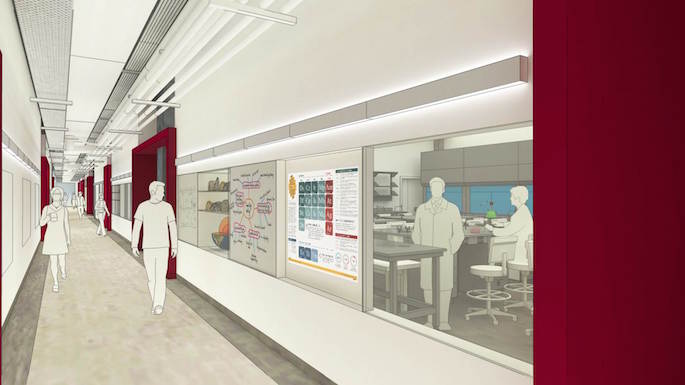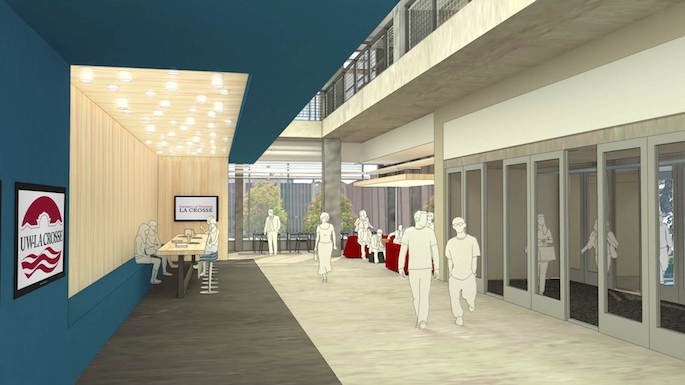Posted 11:23 a.m. Wednesday, Jan. 17, 2018

Largest single gift ever to UW-La Crosse will transform science education, name building.
Largest single gift ever to UW-La Crosse will transform science education, name building
A $2 million gift to the University of Wisconsin-La Crosse — the largest single gift ever to the campus — will do more than name the new Science Labs Building under construction. It will be transformative to the way science is taught. Prairie Springs: The Paul Fleckenstein Trust is donating $2 million to support research and scholarship at UW-La Crosse in the areas of environmental studies and education, wildlife habitat protection, wildlife protection, conservation and ecological technology. With the gift, the new $82 million science classroom and labs building will be named the Prairie Springs Science Center. “We hope that this gift will help to support a margin of excellence for UW-La Crosse, which continues to attract outstanding students,” says Carolyn (Fleckenstein) Scott, a 1985 UWL graduate who is a trustee of the Prairie Springs trust. She is the sister of Paul Fleckenstein. "Words cannot begin to express our gratitude to Carolyn and Jay Scott, and the Paul Fleckenstein Trust," says UWL Chancellor Joe Gow. "Their extraordinary generosity is an inspiration to us all." Greg Reichert, vice chancellor of UWL Advancement and president of the UWL Foundation, says the gift will help inspire others. “This is a very transformational gift for the university,” says Reichert. “We hope this gift will encourage others to consider investing in UW-La Crosse.” The generous gift will focus on establishing educational programs that will take place in the new science labs and classroom building opening this summer. Since the current science building was constructed in the mid-’60s, science education has changed — moving from a “teaching-science-by-showing” model to “teaching-science-by-doing,” says Roger Haro, interim associate dean of UWL’s College of Science and Health. Today, student learning has a “hands-on, minds-on” approach, explains Haro, the 2015 Wisconsin State Professor of the Year. Employers expect students to have a considerable amount of real world, hands-on, practical laboratory experiences prior to graduation, he notes. These expectations, and the evolution of how to teach and do research, have driven the intense need for a laboratory building, says Haro. “This building and generous gift will provide greater opportunity for our students to participate,” he explains. “The endowment provides much more potential for students to work next to faculty, and for faculty to work side-by-side with their colleagues.” [caption id="attachment_50810" align="alignnone" width="685"] The Prairie Springs Science Center will have 36 instructional labs and 23 research labs.[/caption]
Mark Sandheinrich, dean of the College of Science and Health, is excited that the gift provides much more than bricks and mortar. “This generous gift is an investment into transformational education,” notes Sandheinrich. “This is where education leads to discovery.”
With the $2 million gift, the UWL Foundation’s “Share the La Cross Experience” scholarship campaign that began in 2013 has reached 85 percent of its $15 million goal through 2019.
The Prairie Springs Science Center will have 36 instructional labs and 23 research labs.[/caption]
Mark Sandheinrich, dean of the College of Science and Health, is excited that the gift provides much more than bricks and mortar. “This generous gift is an investment into transformational education,” notes Sandheinrich. “This is where education leads to discovery.”
With the $2 million gift, the UWL Foundation’s “Share the La Cross Experience” scholarship campaign that began in 2013 has reached 85 percent of its $15 million goal through 2019.
The $2 million gift does much more than name a building. It transforms science education.
With the generous gift from Prairie Springs: The Paul Fleckenstein Trust to UW-La Crosse, the new science labs building will be named the Prairie Springs Science Center. The $2 million gift creates the Prairie Springs Endowment Fund to support the areas Fleckenstein designated in his trust:- environmental studies and education
- wildlife habitat protection
- wildlife protection
- conservation
- ecological technology
Who was Paul Fleckenstein?
https://youtu.be/J4XHBbixQQY Paul Fleckenstein, who died in 2011, was a steadfast supporter of environmental education and conservation programs. As the executive director of the RA Stevens Foundation and through his personal contributions, Fleckenstein supported organizations such as the Urban Ecology Center in Milwaukee, The Nature Conservancy — in particular their work at the Mukwonago Watershed — and the Wisconsin Flagship, the Denis Sullivan Schooner, now affiliated with Discovery World in Milwaukee. Fleckenstein graduated from UW-Milwaukee with a major in urban education. Fleckenstein cherished his home in Genesee Depot, Wisconsin, just west of his native Brookfield, that he called Prairie Springs. He was dedicated to land restoration and was happiest when he was personally working to plant trees, remove invasive species, or care for his gardens. In recognition of his Prairie Springs home, Fleckenstein’s charitable trust is named Prairie Springs: The Paul Fleckenstein Trust. Fleckenstein was the brother of Carolyn Scott, who earned a degree in therapeutic recreation from UWL in 1985. Scott’s husband, Jay Scott, earned a degree in recreation parks and administration from UWL in 1984. The Scotts are trustees of Prairie Springs: The Paul Fleckenstein Trust. The Prairie Springs Science Center at UWL will join the Prairie Springs Environmental Education Center at Carroll University in supporting scholarship and research at two of Wisconsin’s institutions of higher education. Carroll University’s Prairie Springs Environmental Education Center, which includes the Paul Fleckenstein Research Laboratory, was completed in September 2016. [caption id="attachment_50812" align="alignnone" width="685"] The Paul Fleckenstein Trust is donating $2 million to support research and scholarship at UW-La Crosse in the areas of environmental studies and education, wildlife habitat protection, wildlife protection, conservation and ecological technology. The gift will be transformative to the way science is taught at UWL.[/caption]
The Paul Fleckenstein Trust is donating $2 million to support research and scholarship at UW-La Crosse in the areas of environmental studies and education, wildlife habitat protection, wildlife protection, conservation and ecological technology. The gift will be transformative to the way science is taught at UWL.[/caption]
Why is this very generous gift being given to UW-La Crosse?
The donation is being given for a number of reasons, says Carolyn Scott. One is the university’s outstanding students. “UW-La Crosse is attracting some of the brightest and most prepared students from our state and region,” she says. Carolyn and her husband, Jay, also point to the university’s outstanding and caring faculty and staff. “The culture of quality instruction within a caring community of faculty and staff is key to a student’s success,” notes Jay. The couple say the gift also thanks state taxpayers for their commitment to the new state-of-the-art facility. “This allows us to support, through an endowment fund, the significant investment the people of the state of Wisconsin have made in the new science labs building,” says Jay. In addition to enhancing the state’s investment, Jay says it fulfills one of Fleckenstein’s dreams. “The gift allows us to fulfill one of the goals Paul identified within his trust, which was to have an impact on environmental education and conservation efforts throughout the State of Wisconsin,” he says. Carolyn adds that the gift complements generous gifts already given to the UWL Foundation. “We’re following the lead of others who have invested in experiential learning at UWL,” she explains. “In particular, we’re able to add to the wonderful challenge grant by Ron and Jane Rada that is generating more than $1 million to support experiential learning opportunities across the campus.” Professor Emeritus Ron Rada, and his wife, Jane, pledged $100,000 to the university as a challenge grant to support experiential learning opportunities across campus. The challenge, still in progress, has already raised more than $700,000.The Prairie Springs Endowment Fund will impact the following areas:
Undergraduate student research, experiential learning and internships —- Research fellowships or internships in environmental studies, wildlife habitat protection and conservation.
- Research fellowships or internships for students with a minor in environmental studies.
- Research fellowships in ecological technology development in cooperation with the Center for Entrepreneurship & Innovation and the College of Science and Health.
- Research fellowships through the River Studies Center focused on rivers, streams, lakes and wetlands in the State of Wisconsin.
- Experiential learning opportunities in environmental education within the School of Education for elementary education majors with a general science minor.
- Scholarships for student participation in regional or national conferences and meetings, or experiential learning activities that are consistent with the purpose of the Prairie Springs Endowment Fund.
- Research fellowships and internships conducted in partnership with the Nature Conservancy at the Mukwonago Watershed, the Urban Ecology Center, Milwaukee Riverkeeper, International Crane Foundation and other organizations supported by Prairie Springs: The Paul Fleckenstein Trust.
Scholarships and academic recognition —
Scholarships for students with demonstrated financial need who intend to pursue a career consistent with the purpose of the Prairie Springs Endowment Fund.- Merit scholarships for students who intend to pursue a career consistent with the purpose of the Prairie Springs Endowment Fund.
- Establishment of the Prairie Springs Award of Excellence for outstanding achievement by faculty and students in the areas of environmental studies and education, wildlife habitat protection, wildlife protection, conservation, and ecological technology.
- Honorarium to support a Prairie Springs Distinguished Environmental Sciences Lecture Series.
Features of the Prairie Springs Center
- $82 million project, funded by the state
- 187,000 square feet (2,000 square feet smaller than Centennial Hall)
- Construction began fall 2016, completed by fall 2018
- 36 instructional labs
- 23 research labs
- Labs will support these programs: biology, biochemistry, chemistry, earth science, geography, microbiology, physics, River Studies Center and Radiation Center.
